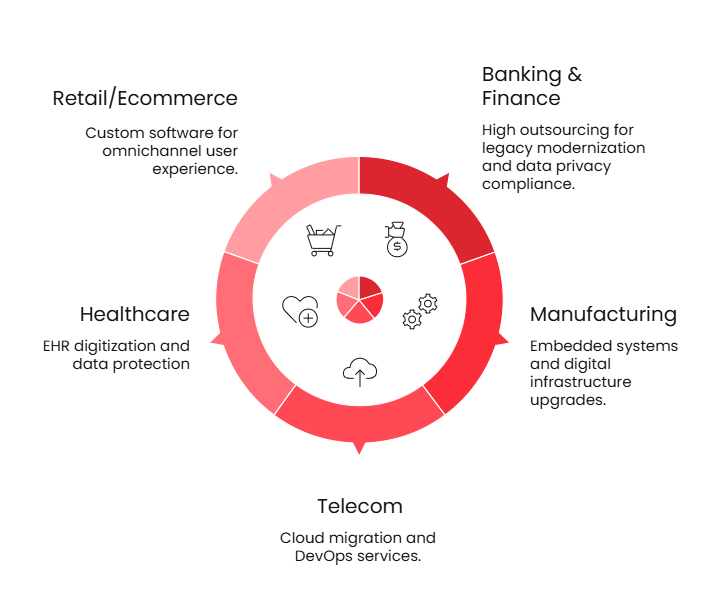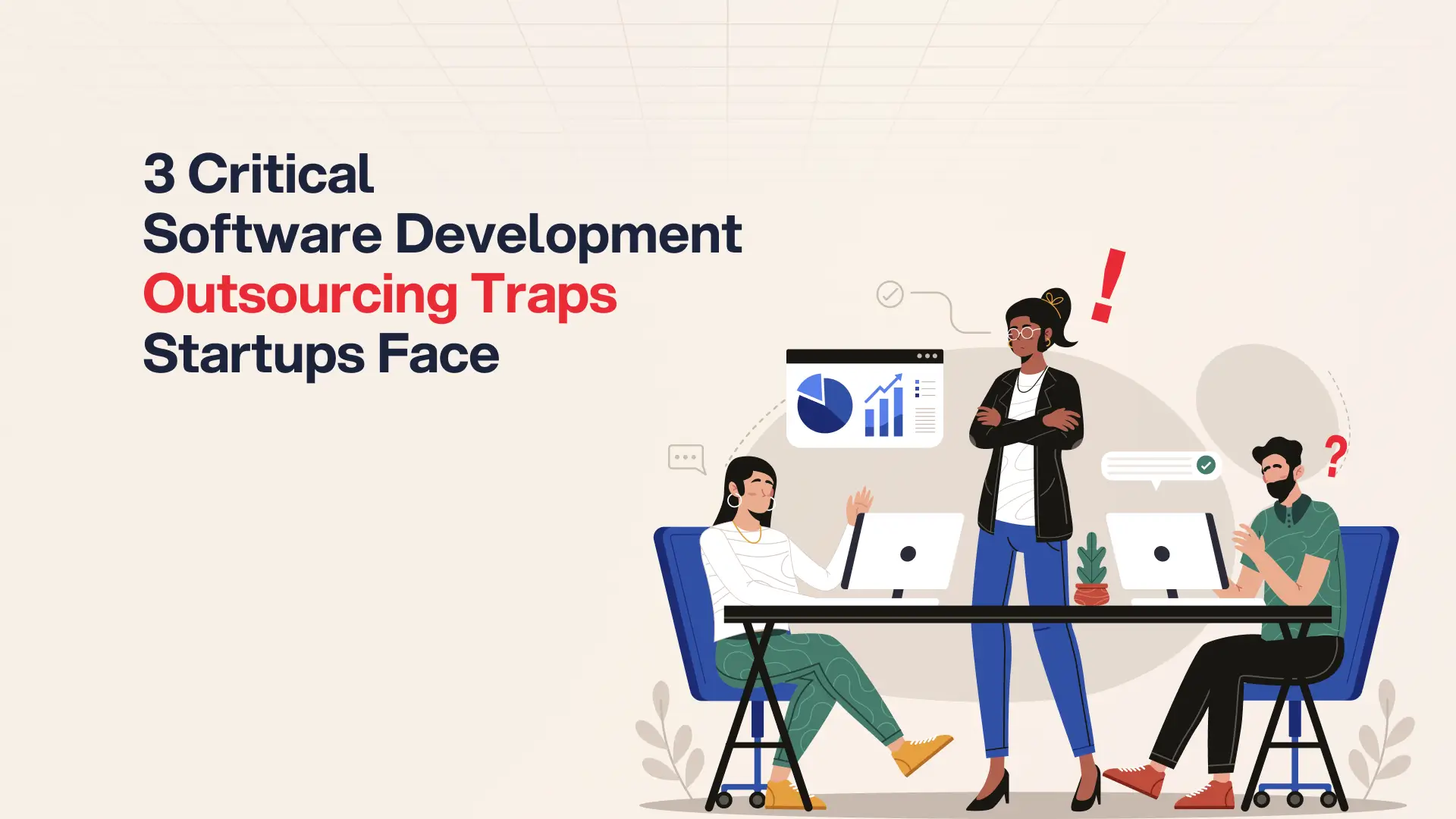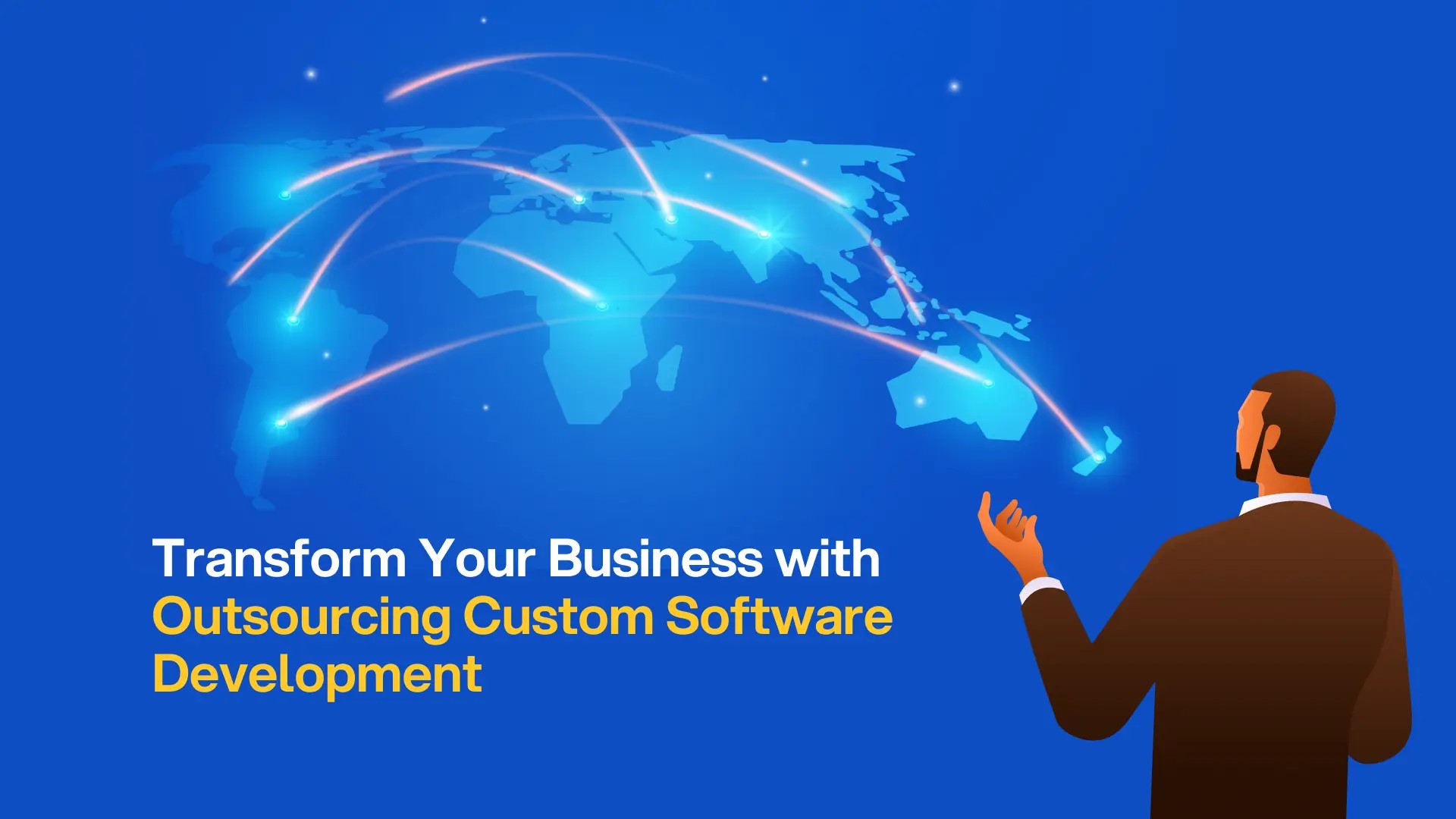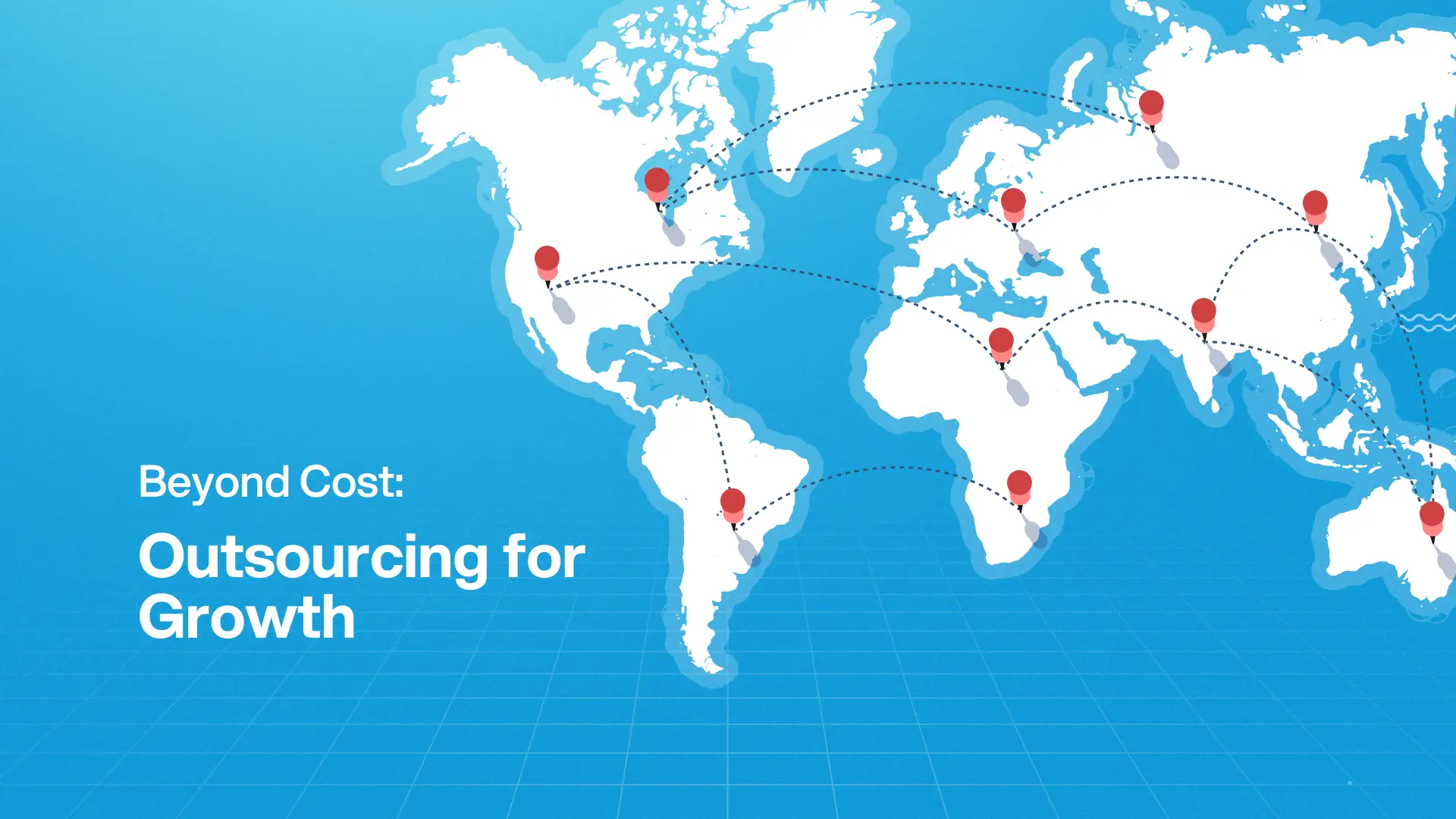Post Activity
 330
330
Table of Content
Share This Post
Table of Content
Japan collaborates with regions like Latin America, Eastern Europe, and ASEAN to achieve cost efficiency while upholding rigorous quality standards. Backed by a robust legal environment and initiatives like Digital Japan 2025, Japan offers vast opportunities for outsourcing firms. This analysis explores the drivers, challenges, and strategies for navigating Japan’s precision-driven IT outsourcing landscape, empowering providers to deliver value.
The Strategic Recap: Drivers of IT Outsourcing
i. Reasons Japan Outsources
- An aging population and limited STEM graduates drive reliance on global talent pools.
- Outdated database systems require custom software and cloud computing modernization.
- Government mandates push rapid software solutions and digital infrastructure upgrades.
- Outsourcing to Latin America and Eastern Europe reduces labor costs while maintaining quality.
ii. Challenges for Outsourcing Providers
- Japan’s precision demands rigorous software quality assurance and ISO compliance.
- Strict data privacy and Copyright Act compliance require legal expertise.
- Limited English proficiency hinders communication.
- UTC+9 complicates real-time collaboration.
- Clients demand AI development and cloud solutions expertise.
Country Playbook: Japan’s Tech Ecosystem
Japan’s technology markets excel in artificial intelligence, cloud computing, cybersecurity, and mobile app development. Innovation hubs in Tokyo, Osaka, Nagoya, Fukuoka, and Kyoto host global leaders like Sony, Toshiba, and NTT, alongside over 1,000 tech startups, ranking Japan 18th globally in startup ecosystem health.
The tech education system, driven by institutions like the University of Tokyo and Kyoto University, produces software developers skilled in programming languages like Java, Python, and C++. Japan’s political system, a stable parliamentary democracy with transparent regulations, fosters a reliable business environment for IT outsourcing.
The economy of Japan at a glance
| Gross Domestic Product | ||
| Annual GDP | USD 4.2 Trillion (2023) | |
| GDP Per Capita | USD 33,767 (2023) | |
| Income Category | High Income (2023) | |
| People | ||
| Population | 123 Million (2025) | |
| Literacy Rate | 99% (2024) | |
| EF English Proficiency Index | Low Proficiency (2024) | |
| IT Sector | ||
| IT Services Market Size | USD 96 Billion (2025) | |
| IT Outsourcing Market Size | USD 40 Billion (2025) | |
| Registered Software Companies | 28,600+ (2025) | |
| Business Environment | ||
| Ease of Doing Business | Score: 78 | Rank: 29 (2020) | |
| Political Stability Indicator | Percentile Rank: 82 (2023) | |
| Corruption Perceptions Index | Score: 73/100 | Rank: 16/180 (2023) | |
The country invests 3.2% of its GDP in education, prioritizing STEM graduates and vocational training to build a skilled talent pool. With a digital infrastructure index of 0.18 and 94% internet penetration, Japan enables seamless real time collaboration. The foreign exchange rate of 148 JPY to USD impacts outsourcing costs and software development rates, while a low inflation rate of 2.4% ensures economic stability for long-term partnerships.
The Evolution of Japan’s IT Sector
Japan’s IT outsourcing journey has evolved from in-house development to strategic global collaboration. In the 1980s and 1990s, firms like Fujitsu and NEC relied on proprietary systems, which limited their agility in agile software development. The 2000s saw companies like NTT Data outsource non-core IT services to domestic vendors. By the 2010s, a talent shortage (Human Capital Index: 0.8) and slow cloud computing adoption drove partnerships with offshore development providers.
Looking for IT Outsourcing Firms?
Explore a curated list of trusted firms based in Japan. Find the right team for your next project.
Today, the Japan Digital Agency, established in 2021, accelerates digital transformation with over $12 billion invested in AI development and semiconductor projects like Rapidus. Japan’s national digital/AI strategy (Global AI Index: 0.73) emphasizes cloud solutions, data privacy, and software solutions, positioning it as a global IT leader despite regional geopolitical instability.
Strategic Imperatives: Why Japan Outsources
Japan’s outsourcing strategy tackles internal challenges and global opportunities:
Talent Shortage: Limited IT professionals drive reliance on nearshore outsourcing (e.g., ASEAN) and offshore development (e.g., India).
Legacy Systems: Modernizing database systems requires custom software, agile workflows, and cloud infrastructure expertise.
Digital Mandates: The national digital/AI strategy pushes rapid software solutions and digital infrastructure upgrades, supported by robust R&D centers.
Cost Efficiency: Regions like Vietnam and Latin America offer competitive software development rates due to lower cost of living.
AI Leadership: Japan’s Global AI Index score of 0.73 fuels demand for AI-driven personalization and advanced tech.
Delivery Models Gaining Ground
Japan employs tailored outsourcing models to balance cost efficiency, control, and quality:
Most Outsourced IT Functions
Retained In House: Core architecture, intellectual property (IP) sensitive development, data privacy compliance, and R&D centers.
Commonly Outsourced: Software development, software quality assurance, data engineering, AI driven personalization, customer support, and call center services.
Leading Outsourcing Destinations
Japan leverages diverse regions, as highlighted in marketdata reports on the best countries to outsource software development:
Sector Focus: Who’s Leading in Japan
The leading sectors in Japan’s IT outsourcing market focus on specific high demand services:
Case Studies: Scaling Success with Tech Talent
Mizuho Financial Group: Legacy Core Modernization
- Partnered with Vietnamese software developers for core system upgrades.
- Transitioned from COBOL to Java using agile workflows, guided by project managers.
- Achieved 35% faster deployment and 40% reduced outsourcing costs.
Rakuten: Cloud Native Development via India
- Collaborated with Indian outsourcing firms for cloud native mobile app development and Minimum Viable Product creation.
- Leveraged agile squads to improve time to market while aligning software development rates.
- Maintained intellectual property control in house.
Ready to Build Your Team?
Let’s create together, innovate together, and achieve excellence together. Your vision, our team – the perfect match awaits.
SoftBank: Nearshoring BPO to the Philippines
- Outsourced call center services and customer support to the Philippines’ BPO industry.
- Enhanced customer base responsiveness with multilingual support.
- Ensured compliance with Japan’s data privacy laws and Copyright Act.
Challenges for Outsourcing Providers
- Stringent Quality Standards: Japan’s precision demands ISO compliant software quality assurance.
Mitigation: Use automated testing and ISO training to meet quality standards efficiently. - Complex Legal Environment: Data privacy and Copyright Act compliance require legal experts.
Mitigation: Hire local legal expertise to streamline compliance. - Cultural and Communication Barriers: Low English proficiency hinders communication skills.
Mitigation: Employ culturally aligned team leads and use Google Meet for project management. - Time Zone Challenges: UTC+9 complicates real-time collaboration with Western Europe or Latin America.
Mitigation: Adopt asynchronous agile workflows and tools like Jira. - High Technical Expectations: Clients demand expertise in AI development, cloud solutions, and data engineering.
Mitigation: Upskill tech professionals in programming languages and partner with tech education programs to attract STEM graduates.
Future Trends in Japanese IT Outsourcing
Digital Mandates: The Japan Digital Agency drives digital transformation across sectors.
AI and RPA: Growing demand for AI-driven personalization and robotic process automation.
Cultural Alignment: Latin America and ASEAN enhance communication skills for nearshore collaboration.
Quality Standards: ISO certified outsourcing firms lead in technology markets.
Sustainable Tech: ESG metrics influence vendor selection amid geopolitical instability risks.
What It Takes to Go Global
To succeed in Japan’s IT software outsourcing market, firms must:
- Enforce strict cybersecurity and IP protection per global standards (e.g., GDPR, ISO 27001).
- Provide ongoing workforce upskilling in tech and communication for client needs.
- Adhere to international labor laws for fair wages and ethical conditions.
- Upgrade the internet and logistics infrastructure for seamless service delivery.
- Diversify clients and plan for political or economic disruptions.
- Use effective tools to overcome language and time zone barriers.
- Draft clear contracts with defined deliverables and penalties.
- Adopt ESG compliant operations to attract ethical clients.
- Conduct regular vendor audits to ensure consistent service quality.
Final Thoughts
Japan’s IT outsourcing market blends precision driven innovation with strategic partnerships across Latin America, Eastern Europe, Western Europe, and ASEAN. As Japan advances its digital infrastructure, embraces AI development, and prioritizes data privacy, its focus on cost optimization and technical expertise positions it as a global leader in software outsourcing, driving sustainable growth and technological excellence.
Find Your Perfect Software Outsourcing Partner
Unlock a world of trusted software outsourcing companies and elevate your business operations seamlessly.






